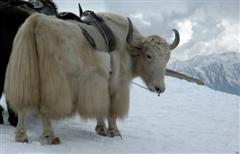|
Yakkin' About Shokay
Yaks, the natural shokay producers, are uniquely resilient animals that have lived mainly in the Himalayan region, Tibet plateau and Mongolia. The Tibetans have raised yaks as their life source for centuries. They are no strangers to using yak down, for warmth in the sub-zero temperatures. 
Shokay Benefits Yak hair is grown in two coats - guard hair and down. The coarse guard hairs are longer and used for braiding into ropes or weaving into ropes, rugs, belts, bags and crafts. The longest hairs of superior strength come from the yak's skirt and tail. Yak fiber is also used locally for blankets, mats, sacks and weaving hut coverings. The guard hairs are removed for maximum fiber softness before the down in made into yarn.
Disadvantages
Yak Wool Care Friction may cause pilling on the fabric surface and can be brushed off. Environmental Benefits The natural habitat of the yak is hills, mountains and plateau. They roam and graze on grasses and lichens. These animals have a lifespan of 20-25 years and can weigh up to 1200 pounds or more. They are easily and readily raised without the use of chemicals, fertilizers or pesticides. Yak fiber is extremely valuable. The annual natural shed of their coat is harvested by gathering or hand-combing, which the animals love. These large bovine animals can naturally produce 1-2 pounds of fiber every year, thereby creating a natural
sustainable resource.
Improving Life In The Himalayas Because of their remoteness, Tibetan herders are among the world's poorest populations, with limited access to education and health care. By hand gathering raw yak fiber, and marketing their knitting skills, they can improve their standard of living to help meet their most basic needs of survival. The Shokay Company is working toward sustainable business opportunities for the local people. Yak fiber is sourced directly from Tibetan herders while preserving their traditional culture and life style. Shokay's intent to promote a new, stylish fiber to the marketplace in a socially conscious manner. Their goal is to invest in the success of remote communities by promoting sustainable development which will empower future generations by ensuring opportunity. This company's positive impact currently provides a healthy and rewarding work environment for the knitters who are bringing their creations to life. Browse their collections, and know that you, too, can make a difference by giving your support. Spinners, Knitters And Weavers Yak yarn is making an impression and it is available in a range of beautiful colors. This is the perfect yarn of one-of-a-kind projects. The fiber is so smooth and so soft, it rivals cashmere. It actually has a warmth that is greater than wool and is perfect for blending with other natural fibers such as
wool
or
silk.
|




